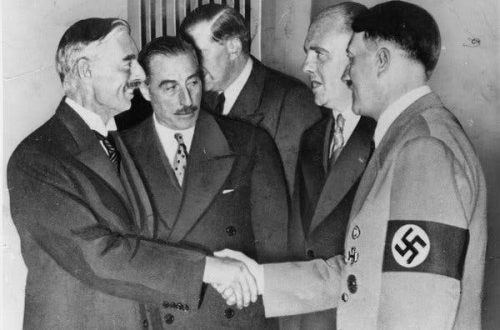As Michael Ezra’s rather masterful guest post “The Atomic bomb and Hiroshima: the least abhorrent choice” has sailed over the edge of the world and into the Harry’s place archives with at least four people still hotly contesting the issues (which have basically grown into a philosophical discussion) I felt that we should have an extension post, not least as a couple of very good points were made just as we lost the thread.
L.R for instance asks:
“Was there a realistic prospect, known to Truman, that if US war aims had been modified – say to the extent that they eventually were modified, allowing to emperor to remain – Japan would have surrendered without the two atomic bombings, or an invasion, or a blockade or other delay that would have resulted in more casualties than the a-bomb route caused?”
Ronald H Spector’s “Eagle against the Sun” (ageing, but still a very accessible history of the conflict) tells us that this wasn’t the case:
“Just a few hours before the bomb fell on Nagasaki, (two days after the Hiroshima bomb in other words – Graham) the Supreme Council for the Direction of War convened at Togo’s urging to discuss acceptance of the Potsdam declaration. Arguments continued for hours, but even the grim news of Nagasaki and Hiroshima did not induce the military representatives to agree that the war should be ended”
Given this, and the fact that it seems to me that any land based invasion of Japan must surely have resulted in more casualties amongst Japanese civilians than the Nuclear bombs themselves (and this without mentioning the estimates of people dying in countries under Japanese occupation or the projected US casualties of an invasion) seems to me conclusive. But Zdenek has a counter argument that suggests naive utilitarianism:
“Imagine a town in which a sheriff holds an innocent man in jail who is known by the sheriff to be innocent. A lynch mob pitches demanding that the prisoner –whom they think is guilty of say rape–is released to them so that they can lynch him. If they do not a riot will ensue in which very likely many people will die. Here is the thing : according to Utilitarianism of the sort that the Hiroshima issue also hinges on, the sheriff has a *moral obligation* to release the prisoner to the lynch mob because in doing so he is stopping a riot.”
But what if the sheriff knows that if he does not release the prisoner to the mob then they both will die and so will many other people in the crush to get at them? His conception of justice would remain “pure” but a fat lot of good it would have done in the practical business of saving lives. Zdenek also suggests that a blockade would have given the Japanese “choice” in the matter (but taken away the choice of those dying in say, Indonesia and left open the possibility of a coup by those who were even more hardline than the Japanese high command.)
The final intervention of the Japanese emperor (who was the only person able to persuade Japanese forces to lay down their arms) was revealed to the world on August 10 (or four whole days after the bomb fell on Hiroshima.)
My own instincts tell me that I could never have ordered that the bomb was dropped. But also that, given that nobody has proved conclusively that Japan would have surrendered without the bombings I am glad Truman did.


